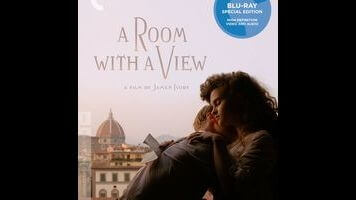At some point during the 1990s, the term “Merchant Ivory”—referring to films made by the team of producer Ismail Merchant and director James Ivory, usually in collaboration with screenwriter Ruth Prawer Jhabvala—became the cinematic equivalent of “Masterpiece Theatre.” It signified quality, but often in a pejorative way, suggesting something British and tasteful and stuffy and frightfully dull. Around that time, the team was dropping biographical duds like Jefferson In Paris (1995) and Surviving Picasso (1996), and they never really recovered (Merchant died in 2005), so the mildly disparaging tone stuck. Which is a shame, because nobody has been more consistently successful at turning great books into, at the very least, very good movies. They did especially well by E.M. Forster, and 1985’s A Room With A View, released as part of the Criterion collection this week, makes literary adaptation look deceptively easy.
Part of Merchant Ivory’s gift was recognizing which masterpieces of world literature would translate well, providing material that can actually be photographed in addition to superlative prose (which can’t). A Room With A View, with its clash between stiff propriety and unruly passion, was ideal, and also provided a superb showcase for some of England’s greatest actors, few of whom were well known at the time. In its first half, a young English woman named Lucy Honeychurch (Helena Bonham Carter), traveling in Florence with her cousin and chaperone, Charlotte (Maggie Smith), encounters a free-spirited young man, George Emerson (Julian Sands), who impulsively kisses her, then sees her instantly whisked back home. The second half then finds Lucy accepting a marriage proposal from the impossibly effete and snobbish Cecil Vyse (Daniel Day-Lewis), only to discover that Cecil has coincidentally met George Emerson and his father (Denholm Elliott) and invited them to move into a nearby cottage, solely to annoy the landlord.
On its surface, then, this is rom-com material, with a woman attempting to choose between two suitors, one of whom is plainly all wrong for her. (See also: most of Jane Austen.) Forster, however, was primarily interested in the contrast between England and Italy, which the filmmakers accentuate by removing Cecil entirely from the Florence section. Characterizing the English upper-class as repressed, the English lower-class as romantic, and all Italians as earthy is a tad simplistic and reductive, but the irresistible fantasy of being transformed by a visit to another country has rarely been so gloriously realized. “Things that are indelicate can sometimes be beautiful,” remarks a minor character early on, summarizing the main theme; the film works in part because George is every bit as ridiculous as Cecil, blundering his way into Lucy’s heart with zero tact or finesse, as if his time in Italy has rendered him permanently high on ecstasy.
It’d be fun to travel back in time to theaters where A Room With A View played during its original theatrical run—it opened in the U.S. in 1986, and went on to be Oscar-nominated for Best Picture—in order to surprise viewers with information from the present. Maggie Smith spends much of her time on screen opposite Judi Dench, playing a novelist also on vacation in Florence; they were both 52 at the time, and the idea that they’d be starring together in a franchise (The Best Exotic Marigold Hotel) nearly three decades later would probably seem absurd. On the other hand, anyone who’d already seen Daniel Day-Lewis as a Cockney punk in My Beautiful Laundrette, and had now been blown away by his equally arresting performance as the twitted, supercilious Cecil, would probably just nod upon hearing that he’s gone on to win a record-setting three Oscars for Best Actor: “Yeah, that makes sense.” The fate of Merchant Ivory makes for less rosy news—1993’s The Remains Of The Day would be its last triumph—but it’s important to remember that there was a time when those two names didn’t amount to a snide dismissal.


































![Rob Reiner's son booked for murder amid homicide investigation [Updated]](https://img.pastemagazine.com/wp-content/avuploads/2025/12/15131025/MixCollage-15-Dec-2025-01-10-PM-9121.jpg)





